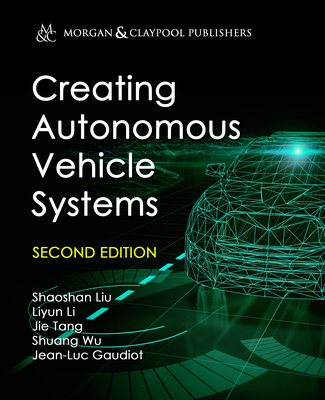Creating Autonomous Vehicle Systems
暫譯: 創建自動駕駛車輛系統
Liu, Shaoshan, Li, Liyun, Tang, Jie
- 出版商: Morgan & Claypool
- 出版日期: 2020-09-11
- 售價: $2,680
- 貴賓價: 9.5 折 $2,546
- 語言: 英文
- 頁數: 244
- 裝訂: Quality Paper - also called trade paper
- ISBN: 1681739356
- ISBN-13: 9781681739359
-
相關分類:
機器人製作 Robots
立即出貨 (庫存=1)
買這商品的人也買了...
-
 Nonlinear Signal Processing: A Statistical Approach (Hardcover)
Nonlinear Signal Processing: A Statistical Approach (Hardcover)$1,200$1,176 -
 Notes on Digital Signal Processing: Practical Recipes for Design, Analysis and Implementation (Hardcover)
Notes on Digital Signal Processing: Practical Recipes for Design, Analysis and Implementation (Hardcover)$3,070$2,917 -
 $148圖像理解-顏色認知計算
$148圖像理解-顏色認知計算 -
 Multipath Effects in GPS Receivers: A Primer
Multipath Effects in GPS Receivers: A Primer$1,460$1,387 -
 Predictive Control for Linear and Hybrid Systems (Paperback)
Predictive Control for Linear and Hybrid Systems (Paperback)$3,180$3,021 -
 Adaptive Control: Second Edition (Dover Books on Electrical Engineering)
Adaptive Control: Second Edition (Dover Books on Electrical Engineering)$1,390$1,321 -
 SLAM 視覺十四講:雙倍內容強化版
SLAM 視覺十四講:雙倍內容強化版$690$545 -
 $3,781Engineering Autonomous Vehicles and Robots: The Dragonfly Modular-Based Approach
$3,781Engineering Autonomous Vehicles and Robots: The Dragonfly Modular-Based Approach -
 深度學習 -- 硬體設計
深度學習 -- 硬體設計$750$675 -
 DIY Lithium Batteries: How to Build Your Own Battery Packs
DIY Lithium Batteries: How to Build Your Own Battery Packs$1,020$969 -
 $4,560Digital System Design using FSMs: A Practical Learning Approach
$4,560Digital System Design using FSMs: A Practical Learning Approach -
 高手才用 C語言:Windows C/C++ 加密解密實戰
高手才用 C語言:Windows C/C++ 加密解密實戰$980$774 -
 實戰物聯網|運用 ESP32 製作厲害又有趣的專題 (Internet of Things Projects with ESP32)
實戰物聯網|運用 ESP32 製作厲害又有趣的專題 (Internet of Things Projects with ESP32)$450$315 -
 Raspberry Pi 樹莓派:12道開胃菜打造 Linux 核心肌群(iT邦幫忙鐵人賽系列書)
Raspberry Pi 樹莓派:12道開胃菜打造 Linux 核心肌群(iT邦幫忙鐵人賽系列書)$680$530 -
 Robust Control: Youla Parameterization Approach (Hardcover)
Robust Control: Youla Parameterization Approach (Hardcover)$1,950$1,911 -
 Robotics, Vision and Control: Fundamental Algorithms in Python, 3/e (美國原版)
Robotics, Vision and Control: Fundamental Algorithms in Python, 3/e (美國原版)$2,780$2,641 -
 Processing for Android: Create Mobile, Sensor-Aware, and Xr Applications Using Processing (Paperback)
Processing for Android: Create Mobile, Sensor-Aware, and Xr Applications Using Processing (Paperback)$2,040$1,938 -
 $4,693Fundamentals and Applications of Colour Engineering
$4,693Fundamentals and Applications of Colour Engineering
商品描述
This book is one of the first technical overviews of autonomous vehicles written for a general computing and engineering audience. The authors share their practical experiences designing autonomous vehicle systems. These systems are complex, consisting of three major subsystems: (1) algorithms for localization, perception, and planning and control; (2) client systems, such as the robotics operating system and hardware platform; and (3) the cloud platform, which includes data storage, simulation, high-definition (HD) mapping, and deep learning model training. The algorithm subsystem extracts meaningful information from sensor raw data to understand its environment and make decisions as to its future actions. The client subsystem integrates these algorithms to meet real-time and reliability requirements. The cloud platform provides offline computing and storage capabilities for autonomous vehicles. Using the cloud platform, new algorithms can be tested so as to update the HD map--in addition to training better recognition, tracking, and decision models.
Since the first edition of this book was released, many universities have adopted it in their autonomous driving classes, and the authors received many helpful comments and feedback from readers. Based on this, the second edition was improved by extending and rewriting multiple chapters and adding two commercial test case studies. In addition, a new section entitled "Teaching and Learning from this Book" was added to help instructors better utilize this book in their classes. The second edition captures the latest advances in autonomous driving and that it also presents usable real-world case studies to help readers better understand how to utilize their lessons in commercial autonomous driving projects.
This book should be useful to students, researchers, and practitioners alike. Whether you are an undergraduate or a graduate student interested in autonomous driving, you will find herein a comprehensive overview of the whole autonomous vehicle technology stack. If you are an autonomous driving practitioner, the many practical techniques introduced in this book will be of interest to you. Researchers will also find extensive references for an effective, deeper exploration of the various technologies.
商品描述(中文翻譯)
這本書是針對一般計算和工程讀者撰寫的第一本自動駕駛車輛技術概述之一。作者分享了他們在設計自動駕駛車輛系統方面的實踐經驗。這些系統非常複雜,由三個主要子系統組成:(1) 用於定位、感知、規劃和控制的演算法;(2) 客戶端系統,例如機器人操作系統和硬體平台;以及 (3) 雲平台,包括數據存儲、模擬、高解析度 (HD) 地圖和深度學習模型訓練。演算法子系統從傳感器的原始數據中提取有意義的信息,以理解其環境並決定未來的行動。客戶端子系統整合這些演算法,以滿足實時和可靠性的要求。雲平台為自動駕駛車輛提供離線計算和存儲能力。利用雲平台,可以測試新的演算法,以更新 HD 地圖,並訓練更好的識別、跟蹤和決策模型。
自本書第一版發行以來,許多大學已在其自動駕駛課程中採用此書,作者也收到了許多有幫助的評論和反饋。基於這些反饋,第二版通過擴展和重寫多個章節以及新增兩個商業案例研究進行了改進。此外,還新增了一個名為「從本書中教學與學習」的部分,以幫助教師更好地在課堂中利用這本書。第二版捕捉了自動駕駛的最新進展,並呈現可用的真實案例研究,以幫助讀者更好地理解如何在商業自動駕駛項目中運用所學。
這本書對學生、研究人員和實踐者都應該是有用的。無論您是對自動駕駛感興趣的本科生還是研究生,您都會在此找到整個自動駕駛技術堆疊的綜合概述。如果您是自動駕駛的實踐者,本書中介紹的許多實用技術將引起您的興趣。研究人員也會發現廣泛的參考資料,以便對各種技術進行有效且深入的探索。






























